Related Research Articles
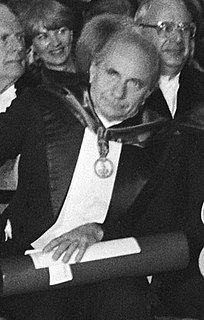
Georges Duby was a French historian who specialised in the social and economic history of the Middle Ages. He ranks among the most influential medieval historians of the twentieth century and was one of France's most prominent public intellectuals from the 1970s to his death.

William Stubbs was an English historian and Anglican bishop. He was Regius Professor of Modern History at the University of Oxford between 1866 and 1884. He was Bishop of Chester from 1884 to 1889 and Bishop of Oxford from 1889 to 1901.

Biblical studies is the academic application of a set of diverse disciplines to the study of the Bible. For its theory and methods, the field draws on disciplines ranging from ancient history, historical criticism, philology, textual criticism, literary criticism, historical backgrounds, mythology, and comparative religion.
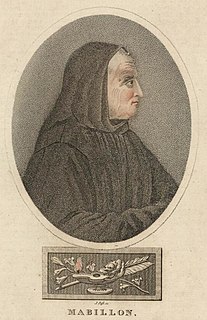
Dom Jean Mabillon, O.S.B., was a French Benedictine monk and scholar of the Congregation of Saint Maur. He is considered the founder of the disciplines of palaeography and diplomatics.
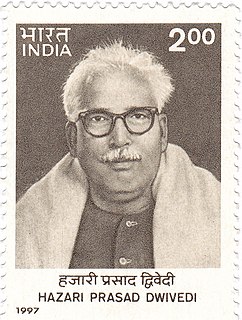
Hazari Prasad Dwivedi was a Hindi novelist, literary historian, essayist, critic and scholar. He penned numerous novels, collections of essays, historical research on medieval religious movements of India especially Kabir and Natha Sampradaya, and historical outlines of Hindi literature.

Christian humanism regards humanist principles like universal human dignity, individual freedom, and the importance of happiness as essential and principal or even exclusive components of the teachings of Jesus. Proponents of the term trace the concept to the Renaissance or patristic period, linking their beliefs to the scholarly movement also called 'humanism'.
Luc d'Achery was a learned French Benedictine of the Congregation of St. Maur, a specialist in the study and publication of medieval manuscripts.
Lambert of Hersfeld was a medieval chronicler. His work represents a major source for the history of the German kingdom of Henry IV and the incipient Investiture Controversy in the eleventh century.
The Cluniac Reforms were a series of changes within medieval monasticism of the Western Church focused on restoring the traditional monastic life, encouraging art, and caring for the poor. The movement began within the Benedictine order at Cluny Abbey, founded in 910 by William I, Duke of Aquitaine (875–918). The reforms were largely carried out by Saint Odo and spread throughout France, into England, and through much of Italy and Spain.

Juliana of Liège, was a medieval Norbertine canoness regular and mystic in what is now Belgium. Traditional scholarly sources have long recognized her as the promoter of the Feast of Corpus Christi, first celebrated in Liège in 1246, and later adopted for the Catholic Church in 1264. More recent scholarship includes manuscript analysis of the initial version of the Office, as found in The Hague, National Library of the Netherlands and a close reading of her Latin vita, a critical edition of which was published in French by the Belgian scholar, Jean-Pierre Delville.
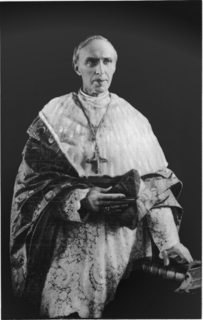
Désiré Félicien François Joseph Mercier was a Belgian cardinal of the Roman Catholic Church and a noted scholar. A Thomist scholar, he had several of his works translated into other European languages. He was known for his book, Les origines de la psychologie contemporaine (1897). His scholarship gained him recognition from the Pope and he was appointed as Archbishop of Mechelen, serving from 1906 until his death, and was elevated to the cardinalate in 1907.
James Daniel Tabor retired in 2022 as a Biblical scholar and Professor of Ancient Judaism and Early Christianity in the Department of Religious Studies at the University of North Carolina at Charlotte,where he taught since 1989 and served as Chair from 2004–14. He previously held positions at Ambassador College, the University of Notre Dame (1979–85), and the College of William and Mary (1985–89). Tabor is the founder and director of the Original Bible Project, a non-profit organisation aimed to produce a re-ordered new translation of the Bible in English.
Jeffrey Burton Russell is an American historian and religious studies scholar.
Michael David Knowles was an English Benedictine monk, Catholic priest, and historian, who became Regius Professor of Modern History at the University of Cambridge from 1954 to 1963. His works on monasticism in England from the times of Dunstan (909–988) to the dissolution of the monasteries are considered authoritative.
Durant Waite Robertson Jr. was a scholar of medieval English literature and especially Geoffrey Chaucer. He taught at Princeton University from 1946 until his retirement in 1980 as the Murray Professor of English, and was "widely regarded as this [the twentieth] century's most influential Chaucer scholar".
Gabrielle Michele Spiegel is an American historian of medieval France, and the current Krieger-Eisenhower Professor of History at The Johns Hopkins University where she served as Chair for the history department for six years and Acting and Interim Dean of Faculty. She also served as Dean of Humanities at the University of California, Los Angeles in 2004–2005, and, from 2008 to 2009, she was the president of the American Historical Association. In 2011, she was elected as a fellow to the American Academy of Arts and Sciences.
Stanley E. Porter is a Canadian–American academic and biblical scholar, specializing in New Testament studies and Koine Greek grammar and linguistics.
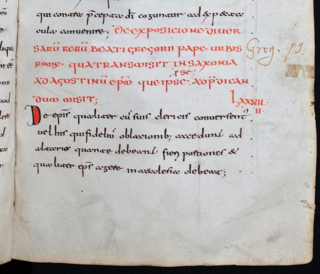
The Libellus responsionum is a papal letter written in 601 by Pope Gregory I to Augustine of Canterbury in response to several of Augustine's questions regarding the nascent church in Anglo-Saxon England. The Libellus was reproduced in its entirety by Bede in his Historia ecclesiastica gentis Anglorum, whence it was transmitted widely in the Middle Ages, and where it is still most often encountered by students and historians today. Before it was ever transmitted in Bede's Historia, however, the Libellus circulated as part of several different early medieval canon law collections, often in the company of texts of a penitential nature.
Nicholas Howe (1953–2006) was an American scholar of Old English literature and culture, whose Migration and Mythmaking in Anglo-Saxon England (1989) was an important contribution to the study of Old English literature and historiography.
Tim Vivian is an American scholar of Early Christianity and Professor Emeritus (retired) of Religious Studies at California State University, Bakersfield.
References
- ↑ Davis, Jennifer R.; McCormick, Michael (March 2016). "In Memoriam: Paul Jeffrey Meyvaert: Historian of Early Medieval Civilization". American Historical Association . Retrieved September 19, 2017.